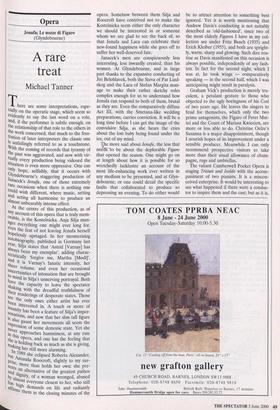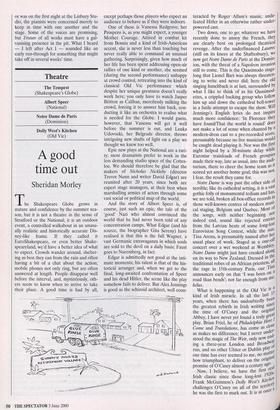Opera A rare
treat
Michael Tanner
There are some interpretations, espe- cially on the operatic stage, which seem so evidently to say the last word on a role, and, if the performer is subtle enough, on the relationship of that role to the others in the work concerned, that much to the frus- tration of later interpreters the classic one 18 unfailingly referred to as a touchstone. With the coming of records that tyranny of the past was aggravated, and now with vir- tttally every production being videoed the situation is even more oppressive. One can Only hope, selfishly, that it occurs with Glyndebourne's staggering production of Janacek's Jenufa, one of those extremely rare occasions when there is nothing one could wish different, where music, setting and acting all harmonise to produce an almost unbearably intense effect. At the centre of this production, as of anY account of this opera that is truly mem- orable, is the Kostelnicka. Anja Silja man- ages everything one might ever long for, even the feat of not leaving Jenufa herself hopelessly upstaged. In her mesmerising autobiography, published in Germany last Year, Silja states that 'Astrid [Varna)] has always been my exemplar', adding charac- teristically 'forgive me, Martha [Modl]', and it is Varnay's fanatic intensity, her sheer volume, and even her occasional u. ncertainties of intonation that are brought to mind in Silja's unnerving portrayal. Both have the capacity to leave the spectator their with the dreadful truthfulness of weir renderings of desperate states. Those are the only ones either artist has ever been interested in. A touch or more of osanitY has been a feature of Silja's imper- nations and now that her slim tall figure is also gaunt her movements all seem the never of some demonic state. Yet she ever. approaches hamminess, at any rate `l,i this Opera, and one has the feeling that she is holding back as much as she is giving, making her still more alarming. but 1989 she eclipsed Roberta Alexander, r,iil Amanda Roocroft, slightly to my sur- vsflse, more than holds her own: she pre- nts a. n alternative of the greatest pathos by almo d dinity, of a wn w ronged, hgst everyone om closest to her, who still affas11 high demands on life and radiantly .nts them in the closing minutes of the opera. Somehow between them Silja and Roocroft have contrived not to make the Kostelnicka seem either the only character we should be interested in or someone whom we are glad to see the back of, so that Jenufa and Laca can celebrate their new-found happiness while she goes off to suffer her well-deserved fate.
Janacek's men are conspicuously less interesting, less inwardly created, than his women. At Glyndebourne, and in large part thanks to the expansive conducting of Jiri Belohlavek, both the Steva of Par Lind- skog and the Laca of Stefan Margita man- age to make their rather sketchy roles complex enough for us to understand how Jenufa can respond to both of them, brutal as they are. Even the comparatively diffuse Act III, with the Smetana-like wedding preparations, carries conviction. It will be a long time before I can get the image of the convulsive Silja, as she hears the cries about the lost baby being found under the ice, out of my mind.
The more said about Jenufa, the less that neecrS "to be about the deplorable Figaro that opened the season. One might go on at length about how it is possible for so wretchedly lacklustre an account of the most life-enhancing work ever written in any medium to be presented, and at Glyn- debourne; or one could detail the specific faults that collaborated to produce so depressing an evening. To do either would be to attract attention to something best ignored. Yet it is worth mentioning that Andrew Davis's conducting is not suitably described as 'old-fashioned', since two of the most elderly Figaros I have in my col- lection are under Fritz Busch (1935) and Erich Kleiber (1955), and both are spright- ly, warm, sharp and glowing. Such dire rou- tine as Davis manifested on this occasion is always possible, independently of any fash- ion. In fact for the second night, which I was at, he took wings — comparatively speaking — in the second half, which I was anticipating might result in paralysis.
Graham Vick's production is merely tru- culent, a petulant gesture to those who objected to the ugly boringness of his Cosi of two years ago. He leaves the singers to fend for themselves, which only the two prime antagonists, the Figaro of Peter Mat- tei and the Count of Mariusz Kwiecien, are more or less able to do. Christine Oelze's Susanna is a major disappointment, though I nourish hopes of its improvement under a sensible producer. Meanwhile I can only recommend prospective visitors to take more than their usual allowance of cham- pagne, rugs and umbrellas.
The valiant Camberwell Pocket Opera is staging Tristan and Isolde with the accom- paniment of two pianists. It is a miscon- ceived enterprise. It would be interesting to see what happened if there were a conduc- tor to inspire them and the cast; but as it is, or was on the first night at the Linbury Stu- dio, the pianists were concerned merely to keep in time with one another and the stage. Some of the voices are promising, but Tristan of all works must have a gal- vanising presence in the pit. What I heard — I left after Act I — sounded like an early run-through for something that might take off in several weeks' time.






































































 Previous page
Previous page